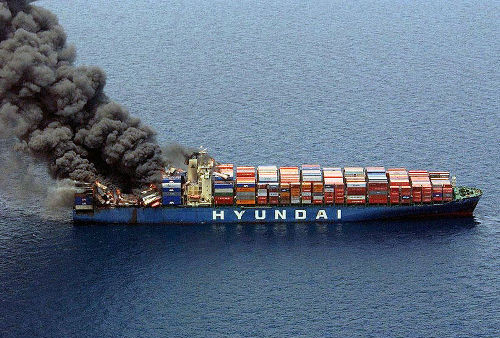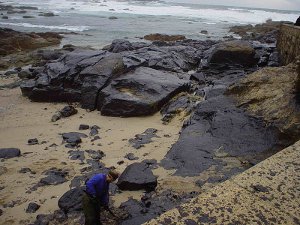Maritime disasters: risks and consequences

The risks of maritime disasters
In marine transport, the risks leading to disasters are of several natures:
- They may be associated to the sea and its hazards. Risks may be predictable (storm, frost) or unpredictable (tsunami, collision with a submarine or a piece of wreckage, a contact with a mine).
- Risks are also related to the state of the ship and to the competency of the crew members (human error has often been the cause of accidents), to the dangerousness of the products shipped, and locally to wars or acts of maritime piracy or terrorism. The growing density of ferries and other fast passenger carriers and boats having an increasingly higher tonnage are also an additional risk factor.
- Risks get bigger in straits, some channels (Panama, Suez) and the “sea highways”, these very much used passages where numerous wrecks end up in shallow waters, which in their turn become potential accident risks for other ships.
- New risks are emerging with the transport of hazardous chemical products, nuclear wastes, ballast water and the use of nuclear-propelled ships and submarines, and sometimes armed with nuclear devices.
The consequences of maritime disasters
The consequences of marine disasters are multiple. They affect particularly:
- The safety of persons and the security of goods: Seagoing personnel are the most exposed of all labour force to the risks of accidents. The passengers' shipwrecks may be very deadly.
- The environment: Accidental pollution and illicit dumping of hydrocarbons have always upset the ecosystem. Oil slicks have triggered big destruction to coastal fauna and flora, to sea bottom and to the habitat of numerous species.
- Health: Marine transport is a carrier of microbes and contagious diseases. In past history, it had caused the spread of serious epidemics, hence the practice of ship quarantine.
- The economy: The loss of a ship and its cargo is indeed a valuable loss. In the specific case of hydrocarbon transport, the claim generates a chain economic consequence, such as the devaluation of the shores, the high costs incurred in beach cleanup operations, the deteriorating image of the tourism sites and the operational losses that ensue, the contamination of fisheries, the technical unemployment of fishing flotilla and related jobs on shore.
Read also | Maritime disasters: prevention and control
Oil slicks, major of maritime disasters
 Cleaning of the spanish coastline in the aftermath of the Prestige catastrophe, November 13, 2002 © Luis Miguel Bugallo Sánchez , CC BY-SA 3.0 Cleaning of the spanish coastline in the aftermath of the Prestige catastrophe, November 13, 2002 © Luis Miguel Bugallo Sánchez , CC BY-SA 3.0 |
A real trauma for the affected regions, martime disaters have a global impact, economically, ecologically and health wise. The big oil slicks are tragic events that have marked the history of hydrocarbon marine transport.
Sea disasters are often associated with the circulation of flag-of-convenience ships. These ships, often old and in poor conditions, are registered under a nationality other than that of the owner.
Such practice allows tax exoneration and non-compliance with standards in terms of security and welfare coverage of crewmembers. The most contentious flags belong to Honduras, Liberia, Malta, Lebanon and Cyprus. Malta, with 1340 ships and 330 tankers, is the world's fourth fleet.
